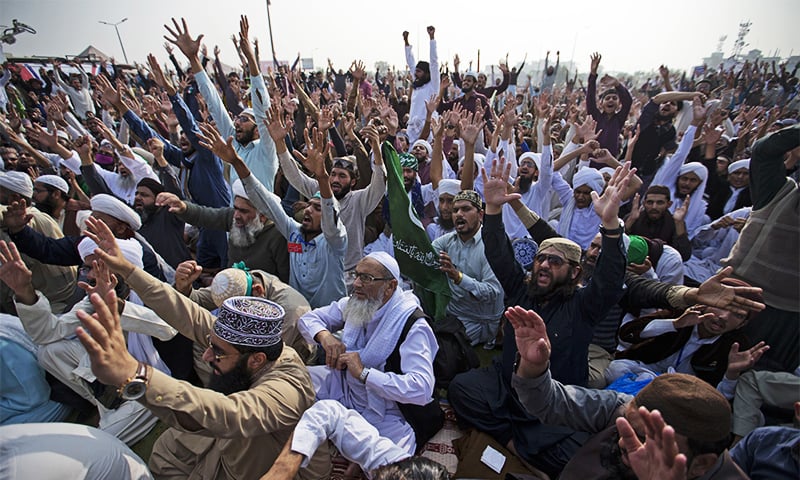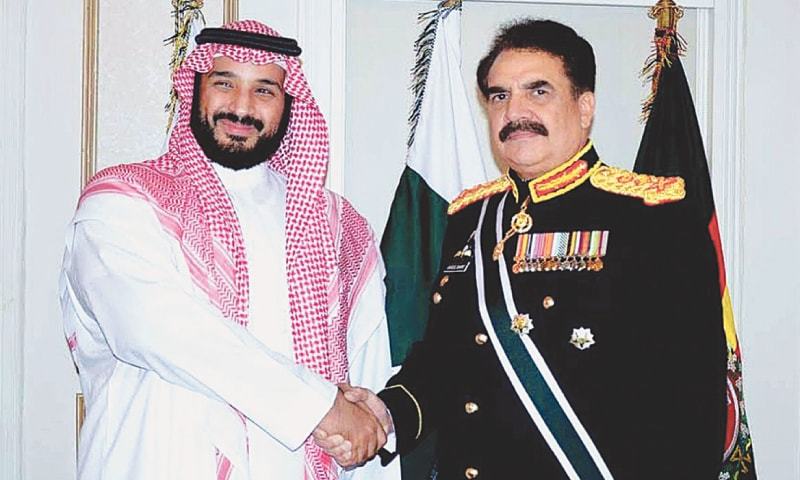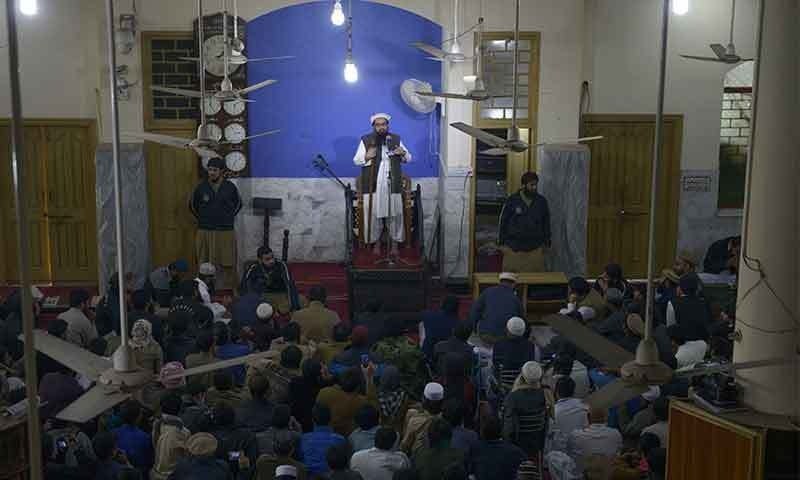2017 in review: The year's biggest headlines on the domestic front
The outgoing year has proved eventful on more accounts than one. It saw many important developments on the political front — of which the ouster of Nawaz Sharif had the most impact — even as a battle against the forces of chaos raged on with occasional triumphs for security forces.
Here, Dawn.com looks at the most eventful happenings that made headlines during 2017.
The disappeared bloggers

The year started with the forced disappearance of five activists known and followed widely on social media for their boundary-pushing views.
The 'deep state' was immediately suspected of involvement, but the accusation was denied by both civilian and military agencies.
The activists abducted during the first week of January 2017 included Waqas Goraya, Asim Saeed, Salman Haider and Ahmed Raza Naseer.
All four later returned to their homes, but no information was shared by the government about the alleged captors.
A fifth activist, Samar Abbas, remains missing.
The year closed on the same note, with rights activist Raza Mahmoud Khan going missing on December 2. His whereabouts remain unknown.
The '#FindRaza' campaign was in full swing at the time of publication of this report.
Nawaz Sharif steps down as PM after SC's disqualification verdict

A serving prime minister was accused and convicted of dishonesty by the country's apex court in a historic casae that ran for nearly six months.
On July 28, Supreme Court Justice Ejaz Afzal Khan announced that a five-member bench had unanimously deemed prime minister Nawaz Sharif unfit for holding public office and also ordered an accountability court to open references against him, his family and other respondents.
Following the verdict, which brought Sharif's third term in power to an unceremonious end, the PML-N said that it would utilise all legal and constitutional means to contest the verdict.
IHC indicts judge, wife in Tayyaba torture case

Ten-year-old Tayyaba, who had been working as a maid in the house of then serving Additional District and Sessions Judge Raja Khurram Ali Khan, was reported to have been tortured brutally by him and his wife, Maheen Zafar.
A compromise was reached between the judge and the minor girl's family on January 2, 2017, but the Supreme Court took suo moto notice of the matter on January 4, 2017 after anger on social media peaked to a crescendo.
Chief Justice of Pakistan Mian Saqib Nisar remarked during early proceedings in the case that there seemed to be no doubt that a criminal act had been committed in the Tayyaba case.
The case remains ongoing.
Islamabad High Court declares Faizabad sit-in 'a terrorist act'

During the passage of the Elections Act 2017, the parliament unwittingly amended a Khatm-i-Nabuwwat oath which lawmakers are required to take before holding office.
As far-right parties got wind of the amendment, they started claiming it had been a deliberate act which formed part of some larger conspiracy to de-Islamicise Pakistan.
Subsequently, Tehreek Labbaik Ya Rasool Allah (TLYR), the Tehreek-i-Khatm-i-Nabuwwat, and the Sunni Tehreek Pakistan (ST) announced countrywide protests, which culminated in a prolonged sit-in at Islamabad's busy Faizabad Interchange, where they gathered to demand the resignation of then law minister Zahid Hamid.
The Islamabad High Court, the Supreme Court and the heads of various religious parties repeatedly called for the protesters to disband, but the gathered crowd persisted for three weeks before the military intervened and mediated a 'peaceful solution' with the protesters.
The army's intervention seems to have been necessitated by the complete failure of a half-hearted operation launched by security personnel, which only resulted in six lives being lost.
The government eventually capitulated to all the demands of the protesters, including the resignation of law minister Zahid Hamid.
Lynching of Mashal Khan over alleged blasphemy

In April, a 23-year-old student of Abdul Wali Khan University, Mardan, was killed and another seriously injured within the university's premises by a vigilante mob for allegedly publishing blasphemous content online.
The lynching of Mashal Khan briefly opened a debate on the frequent abuse of blasphemy laws, but his father has since struggled to secure justice.
Mashal was described by his teachers as a “brilliant and inquisitive” student who used to complain “about the political system of the country”. However, his teachers vowed that they “never heard him saying anything controversial against the religion”.
Raheel Sharif takes over as chief of multinational military alliance

The former army chief, retired Gen Raheel Sharif, landed a job as the head of a Saudi Arabia-led 39-nation Islamic Military Alliance amid criticism from within the country but also from neighbouring Iran — which has been excluded from the force.
The development was portrayed as a step that would support the Muslim world struggling to combat terrorism and as a reason for the unity of the Muslim Ummah.
The government had issued a no-objection certificate for Sharif to join the alliance — which is being dubbed as a ‘Muslim Nato’ — after an understanding was reached between Pakistan and Saudi Arabia on the matter.
Radical religious parties enter mainstream politics

The resurgence of the religious ultra-right in politics in 2017 is being considered by many to be a matter of grave concern for state and society, especially with the 2018 general elections right around the corner.
The spectre of mainstreamed fundamentalism raised its head when two newly-formed religious parties captured 11 per cent of the overall vote cast in the NA-120 by-polls. The parties, which had not existed at the time of the last general election, owed their creation to two separate radical ideologies.
Although there has not been a formal state policy regarding the mainstreaming of radical groups, it is generally perceived that the new parties have the blessing of the military establishment. A statement from the military's spokesman that “every Pakistani has a right to form a political party” gives more credence to this belief.
Hafiz Saeed walks free

Jamaatud Dawa (JuD) leader Hafiz Saeed walked free after spending around 300 days in house arrest. The Punjab government set him free after a provincial review board ordered his release following the failure of the home department to justify Saeed’s detention.
India slammed the decision and accused Pakistan of trying to mainstream a terrorist, thus designated by the US Justice Department.
Soon after, the United States urged Pakistan to re-arrest Saeed and try him for the crimes he is accused of committing.
Launch of Raddul Fasaad

In February, the military announced the launch of yet another operation across the country, naming this one 'Operation Raddul Fasaad ' (elimination of discord). The stated objectives of the operation included eradicating residual terrorist threats, consolidating the gains made in counter-terrorism operations, tightening security along the borders and curtail militants’ escalating campaign of urban terrorism.
It entailed coordinated action by all wings of the armed forces as well as paramilitary organisations, civilian law-enforcement agencies and intelligence outfits.
Military tribunal sentences Jadhav to death
Kulbhushan Jadhav, a serving Indian navy officer and self-confessed spy, was awarded the death sentence by a Field General Court Martial on charges of spying and sabotage.
As expected, the Indian government lodged a strong protest against the punishment and asserted that if the sentence was awarded without following the basic norms of law and justice, it would be regarded as a “premeditated murder”.
Subsequently, India moved the International Court of Justice (ICJ) and the UN's top court stopped Pakistan from executing the death sentence.
ICJ urged Pakistan “to take all measures to ensure that Mr Jadhav is not executed till the final decision of this court.”
Nationalist parties resist Fata reforms

A draft law seeking the mainstreaming of Federally Administered Tribal Areas (Fata) has been pending with the National Assembly for months as the government has repeatedly failed to win over JUI-F chief Maulana Fazlur Rehman and PkMAP president Mehmood Khan Achakzai on the proposed reforms for the tribal areas bordering Afghanistan.
Deadlock over the implementation of the proposed Fata reforms package — which seeks merger of Fata with Khyber Pakhtunkhwa and extension of the superior courts’ jurisdiction to the region — continues to persist, despite reports that Prime Minister Shahid Khaqan Abbasi has taken a decision on the matter.




